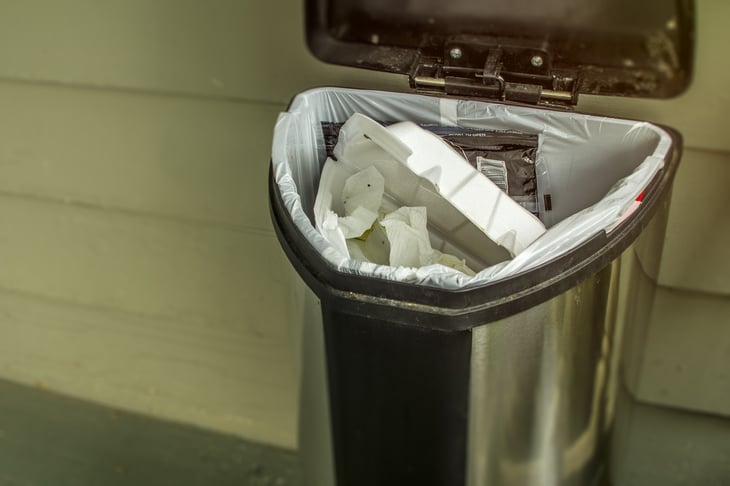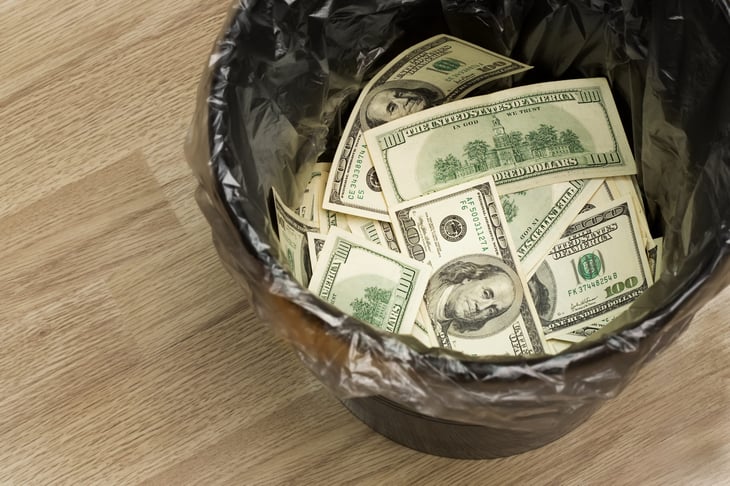
Editor's Note: This story originally appeared on Living on the Cheap.
Are you wasting your money?
Too many of us get to the end of the month, look at our dwindling bank account balances and wonder where all the money went. If you were to go back and really look at where all that money is going, you might find that you’re wasting it rather than using it wisely.
If you want to make your money work harder for you, you’ve got to know where it’s going so you can redirect it. So, where is your money going? Most Americans waste money on the following items …
1. Credit card interest

A 2021 report from Experian indicated that the average credit card debt in U.S. households was $5,525. That’s a lot of interest paid on credit card balances. If you’re carrying a credit card balance, that might be one of your biggest money wasters.
2. Overdraft bank fees

The average overdraft fee in the U.S. was $33.58 in 2021, according to researchers at Statista.com. (A bank charges an overdraft fee when you don’t have enough money in your account to cover a transaction.) Pay attention to your finances and avoid overdrawing your account, or you’ll waste your money on needless fees.
3. Dining out

According to the U.S. Department of Agriculture, the average American spent almost 28% of every food dollar in 2020 on eating out — and that was during the first year of the pandemic when restaurant spending actually declined! You might not think dining out is a waste of money, but if you’re looking to cut expenses or save money, there are certainly ways in which you can have fun and stay fed for less.
4. Throwing away food

The National Resources Defense Council estimates that Americans waste $165 billion a year (about $529 per person) by throwing out food. And you know how often you let the lettuce go bad in your fridge, or buy a bunch of parsley just to use a few sprigs. Not to mention that special oil, dressing or specialty food that you need for one recipe and never use again.
5. Gym membership

According to a survey commissioned by Finder.com, 7.4% of the people who are paying for a gym membership are using it less than once a month. Think about how much you pay for your gym membership and how many days a week (or month!) you actually go, and you’ll realize that you might be wasting a lot of money each year on a membership you don’t actually use.
You can think the same about any other subscriptions you have. Do you read The New York Times online every day, or use your paid-for meditation app? Do those magazines pile up and gather dust, and do you go to the zoo or science museum enough to justify your membership? If not, these are all places you’re wasting your money.
6. Energy

Energy Star reports that the average family spends more than $2,000 on energy bills each year, almost half of which goes toward heating and cooling. By following Energy Star recommendations for cutting costs, you could save one-third of that, according to government data.
3 tips to stop wasting your money

Once you consider where your money is going, estimates are that you are probably wasting between 10% and 15% of your income each month. Ouch!
You could definitely be putting your money to better use. If you want to recover your wasted income and then use it to improve your long-term financial situation, here are the three top things you can do.
1. Evaluate what you really use

From the expensive cable package to the gym membership, be honest about what you use. Cancel magazine subscriptions, stop paying for the unused gym membership and consider replacing your cable with low-cost streaming services like Hulu and Netflix.
2. Plan ahead

One of the best ways to stop wasting money is to plan ahead. Meal planning can be a great way to stop spending so much on dining out, as well as reduce what you throw away. Create a meal plan each week, using coupons and sales as a guide. Then, shop according to your list. You’ll spend less time “just grabbing something” on the way home and you’ll throw away less food when you buy with a purpose.
When you want to eat out, plan to visit restaurants on “kids eat free” days, or take advantage of daily specials to spend less.
Planning ahead works in other areas as well. From planning out your energy usage to making travel plans in advance, it’s possible for you to find ways to save money when you are prepared for what’s next.
3. Pay down debt

If you want to stop wasting money on interest charges, you need to pay down debt. You can even negotiate lower interest rates with many credit card issuers so that more of your monthly payment goes toward debt reduction.
Related to paying down debt is generally paying attention to your finances. Track your spending so that you don’t incur overdraft fees, which can cost anywhere between $25 and $45, depending on the bank.
Stop spending on the things you don’t need, and pay attention to what’s happening with your money. Once you start planning your finances around what really matters to you, a lot less of your money will go to waste.





Add a Comment
Our Policy: We welcome relevant and respectful comments in order to foster healthy and informative discussions. All other comments may be removed. Comments with links are automatically held for moderation.